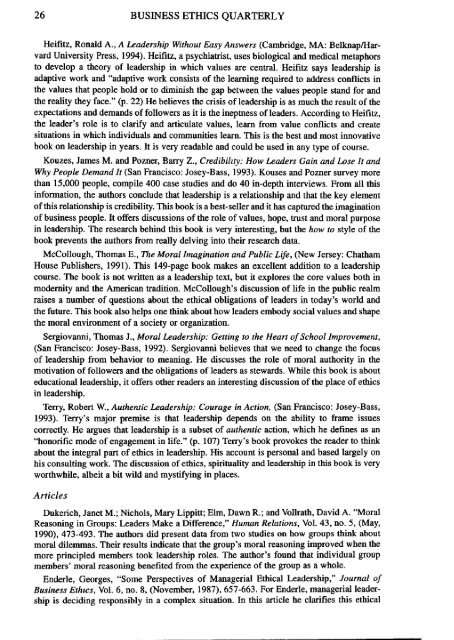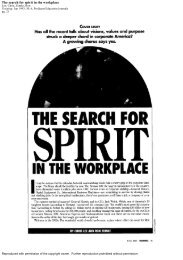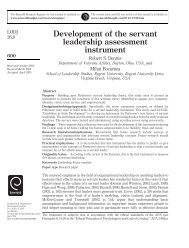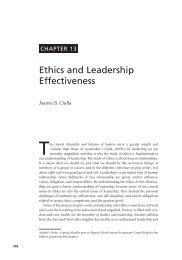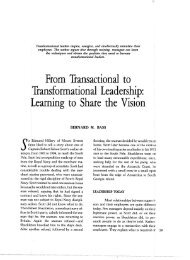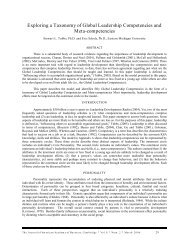LEADERSHIP ETHICS: MAPPING THE TERRITORY - Strand Theory
LEADERSHIP ETHICS: MAPPING THE TERRITORY - Strand Theory
LEADERSHIP ETHICS: MAPPING THE TERRITORY - Strand Theory
You also want an ePaper? Increase the reach of your titles
YUMPU automatically turns print PDFs into web optimized ePapers that Google loves.
26 BUSINESS <strong>ETHICS</strong> QUARTERLY<br />
Heifitz, Ronald A., A Leadership Without Easy Answers (Cambridge, MA: Belknap/Harvard<br />
University Press, 1994). Heifitz, a psychiatrist, uses biological and medical metaphors<br />
to develop a theory of leadership in which values are central. Heifitz says leadership is<br />
adaptive work and "adaptive work consists of the learning required to address conflicts in<br />
the values that people hold or to diminish the gap between the values people stand for and<br />
the reality they face." (p. 22) He believes the crisis of leadership is as much the result of the<br />
expectations and demands of followers as it is the ineptness of leaders. According to Heifitz,<br />
the leader's role is to clarify and articulate values, learn from value conflicts and create<br />
situations in which individuals and communities learn. This is the best and most innovative<br />
book on leadership in years. It is very readable and could be used in any type of course.<br />
Kouzes, James M. and Pozner, Barry Z., Credibility: How Leaders Gain and Lose It and<br />
Why People Demand It (San Francisco: Josey-Bass, 1993). Kouses and Pozner survey more<br />
than 15,000 people, compile 400 case studies and do 40 in-depth interviews. From all this<br />
information, the authors conclude that leadership is a relationship and that the key element<br />
of this relationship is credibility. This book is a best-seller and it has captured the imagination<br />
of business people. It offers discussions of the role of values, hope, trust and moral purpose<br />
in leadership. The research behind this book is very interesting, but the how to style of the<br />
book prevents the authors from really delving into their research data.<br />
McCoUough, Thomas E., The Moral Imagination and Public Life, (New Jersey: Chatham<br />
House Publishers, 1991). This 149-page book makes an excellent addition to a leadership<br />
course. The book is not written as a leadership text, but it explores the core values both in<br />
modernity and the American tradition. McCoUough's discussion of life in the public realm<br />
raises a number of questions about the ethical obligations of leaders in today's world and<br />
the future. This book also helps one think about how leaders embody social values and shape<br />
the moral environment of a society or organization.<br />
Sergiovanni, Thomas J., Moral Leadership: Getting to the Heart of School Improvement,<br />
(San Francisco: Josey-Bass, 1992). Sergiovanni believes that we need to change the focus<br />
of leadership from behavior to meaning. He discusses the role of moral authority in the<br />
motivation of followers and the obligations of leaders as stewards. While this book is about<br />
educational leadership, it offers other readers an interesting discussion of the place of ethics<br />
in leadership.<br />
Terry, Robert W, Authentic Leadership: Courage in Action, (San Francisco: Josey-Bass,<br />
1993). Terry's major premise is that leadership depends on the ability to frame issues<br />
correctly. He argues that leadership is a subset of authentic action, which he defines as an<br />
"honorific mode of engagement in life." (p. 107) Terry's book provokes the reader to think<br />
about the integral part of ethics in leadership. His account is personal and based largely on<br />
his consulting work. The discussion of ethics, spirituality and leadership in this book is very<br />
worthwhile, albeit a bit wild and mystifying in places.<br />
Articles<br />
Dukerich, Janet M.; Nichols, Mary Lippitt; Elm, Dawn R.; and Vollrath, David A. "Moral<br />
Reasoning in Groups: Leaders Make a Difference," Human Relations, Vol. 43, no. 5, (May,<br />
1990), 473-493. The authors did present data from two studies on how groups think about<br />
moral dilemmas. Their results indicate that the group's moral reasoning improved when the<br />
more principled memb^s took leadership roles. The author's found that individual group<br />
members' moral reasoning benefited from the experience of the group as a whole.<br />
Enderle, Georges, "Some Perspectives of Managerial Ethical Leadership," Journal of<br />
Business Ethics, Vol. 6, no. 8, (November, 1987), 657-663. For Enderle, managerial leadership<br />
is deciding responsibly in a complex situation. In this article he clarifies this ethical


